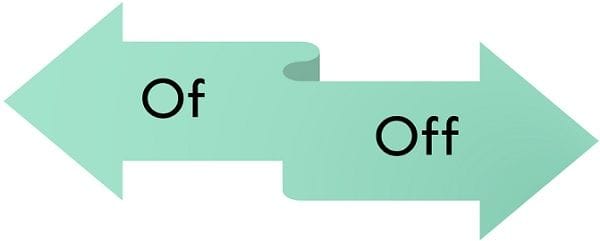Off Vs Of Examples: A Comprehensive Guide for Indian English Learners
Contents

As a non-native English speaker in India, you may often find yourself confused between certain words that sound similar but have distinct meanings and uses. One such pair of confusing words is 'off' and 'of'. It's quite a common error to use these interchangeably, which can lead to misunderstandings in communication.
Why does the accurate usage of these tiny prepositions matter? They are the glue that holds our sentences together and gives them meaning. A slip-up in their usage can change the entire context of your conversation. Therefore, understanding 'off' vs 'of', along with their correct contexts, can greatly enhance your English skills.
In this blog post, we aim to uncover the usage of 'off' and 'of'. We'll explore their meanings, provide context-specific examples and share tips for easy remembrance. So let’s embark on this journey of mastering these two commonly muddled prepositions!
What are 'Off' and 'Of'?
'Off' and 'Of' are two tiny words that pack a big punch in English communication. They are distinct in meaning but often misused because of their similar sound.
The word 'Off' is used as a preposition, adverb, adjective, or even a verb. It generally denotes detachment or separation. Here are some example sentences for each usage:
Preposition | Take the book off the table. |
Adverb | He nodded off during the meeting. |
Adjective | She wore an off-white dress to the party. |
Verb | He decided to off the main switch. |
On the other hand, 'of' is primarily a preposition expressing a relationship between parts of something or belonging to something. For example, "I am proud of my heritage." or "A slice of cake."
Understanding how these words function can remove confusion and greatly enhance your spoken English proficiency. You can also check out a similar guide from Clapingo on Mastering the Usage of 'To' vs 'For'. Understanding these differences can empower you to communicate effectively and fluently in English.
Remember, every small step brings you closer to mastering the English language!
Common Misuses of Off vs Of & How to Avoid Them

One common misuse of 'off' and 'of' among non-native English speakers in India is in their conversational English. For instance, look at these commonly used sentences like "Get of the bus!" or "Switch of the lights."
These sentences use the words of and off incorrectly. The correct usage would be:
"Get off the bus!"
"Switch off the lights."
To avoid such errors, focus on understanding that 'off' refers to separation or detachment while 'of' is used to show possession or a relation between two things. So here's a quick tip - when unsure about which word to use, pause and consider whether there's an action indicating departure or separation. If yes, go for 'off'. If you're showing possession or relation between two entities, use 'of'. Here is a conversation snippet that uses both words:
John: "Did you turn off the TV?"
Ravi: "Yes, right after the end of the match."
Practice using these words in daily conversations and writing exercises to master their usage. Make it a game if you like - observe your peers using English and spot the misuses of 'off vs of'. This will reinforce your learning!
Using Off vs Of Correctly – Practice Makes Perfect!
Now that we've discussed the differences between 'off' vs 'of', it's time to practice. Let's take a look at some exercises that will help you use these words correctly in various contexts.
Choose the correct word for each sentence:
1) Can you take your foot ___ the table?
2) The pen is made ___ plastic.
3) She lives just ___ main street.
4) I need to dust ___ this old furniture.
5) The colour ___ her dress is beautiful
Do exercises like these regularly, and you'll soon be comfortable using both 'off' and 'of'.
Here are the answers to the above questions for you to check:
1) off 2) of 3) off 4) off 5) of
For deeper understanding and practice, check out our comprehensive guide on Learn English Grammar Step By Step: Your Comprehensive Guide on Clapingo's blog.
Parting Thoughts
With our journey through the difference between 'off' and 'of' coming to a close, we hope this article has enlightened you on the subtle yet essential differences between these two prepositions. It's all about context. Remember, 'off' typically suggests separation or removal, while 'of' suggests a connection or belongingness.
With a large number of confusing words like 'off' and 'of' to cover, English mastery cannot be an overnight achievement. It demands continuous learning and practice. Learning platforms like Clapingo can be extremely helpful in this journey. They provide one-on-one personalised coaching sessions with expert tutors, making learning engaging and effective.
Embrace your errors as stepping stones to improvement and remember that fluency comes with practice and patience. On this note, let's wrap up with an empowering message: no matter where you come from or what your native language is, mastering English is absolutely within your reach!
FAQs
1. Is it correct to use off of?
Yes, but it's more prevalent in American English than British English. In most cases though, just using "off" conveys the same meaning.
2. How do I use off in a sentence?
The word 'off' is used in sentences to show separation or detachment from something. For instance: "She took her jacket off because it was too warm."
3. Do you have an example of ‘off’ and ‘of’?
Yes! For 'of': "The pages of the book are yellowing." For 'off': "The cat jumped off the roof."
Comments
Your comment has been submitted